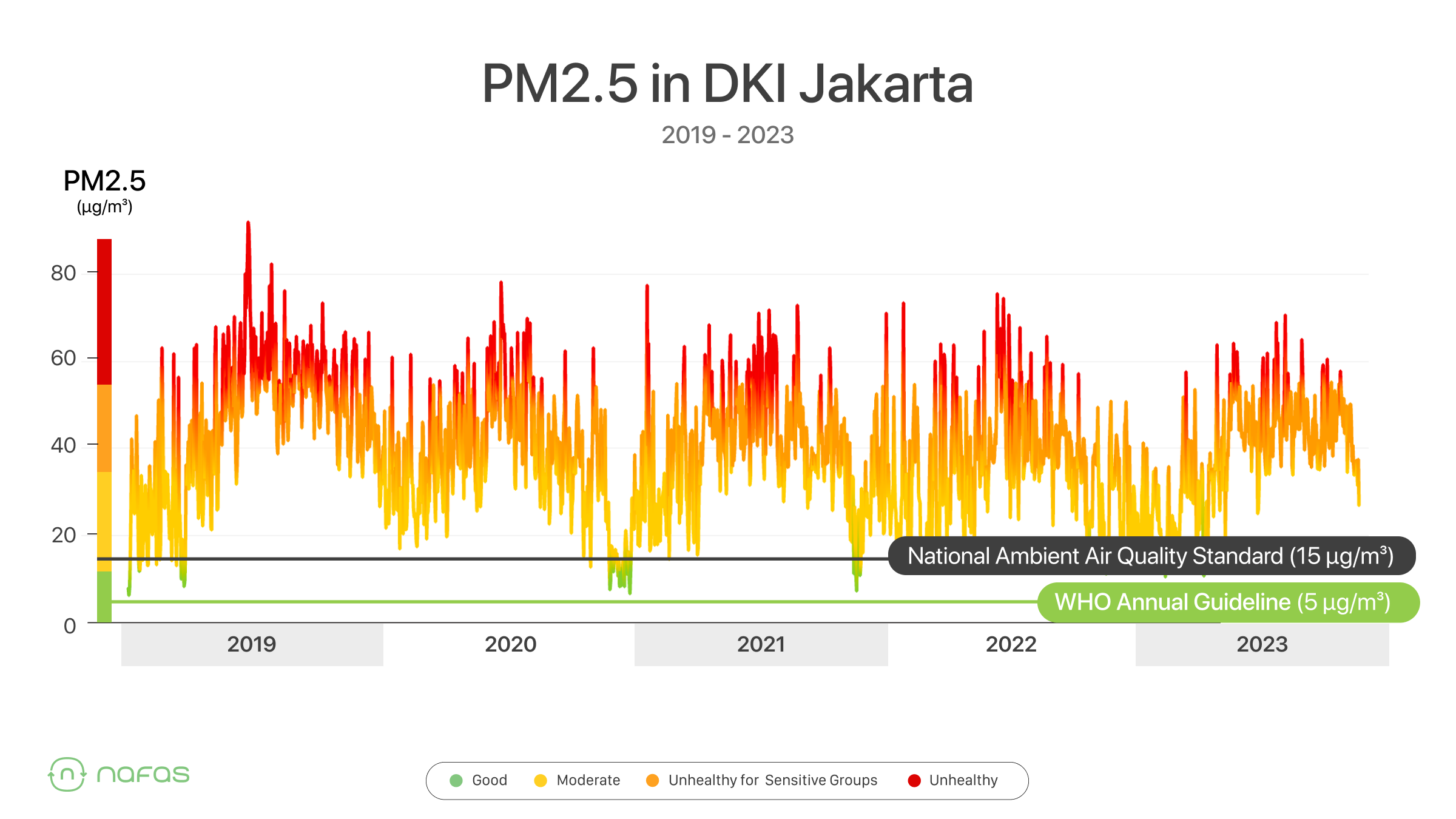Has Justice Been Served? The Impact of the Supreme Court Ruling on Jakarta's Air Pollution
The Supreme Court of Indonesia just rejected the government’s cassation for an air pollution citizen lawsuit. This means that the people of Jakarta will soon see changes in the city’s air quality, backed by Indonesian law. A win for the citizens 🏆!
Here is their journey of seeking environmental justice for the people of Jakarta.
A Retrospective of The Citizen Lawsuit Case 🕰️

- July 4th, 2019
Clean City and Universal Air Initiative (IBUKOTA) Coalition, which consisted of Greenpeace, WALHI, and LBH Jakarta filed a lawsuit on regarding air contamination to several defendants, which are: (1) the President of Indonesia, (2) the Ministry of Internal Affairs, (3) the Ministry of Health, (4) the Ministry of Environment, (5) the Government of Jakarta, (6) the Government of Banten, and (7) the Government of West Java.
- September 16th, 2021
After being adjourned for several months due to the pandemic, the lawsuit was partially approved by the judges of Central Jakarta’s Court.
The partial approval of the lawsuit only consisted of five defendants, which are (1) the President of Indonesia, (2) the Ministry of Internal Affairs, (3) the Ministry of Health, (4) the Ministry of Environment, and (5) the Government of Jakarta. The governments of Banten and West Java weren’t included in the list.
- October 17th, 2021
It was also affirmed by the High Court of DKI Jakarta.
- January 20th, 2023 and January 13th, 2023
Following the court’s decision, the President and the Minister of Environment separately filed a cassation to the Supreme Court for this issue. Cassation refers to a legal process where a higher court reviews the decisions made by lower courts.
- November 13th, 2023.
However, it was rejected by the judges
Environmental-related Court Outputs ⚖️
Addressing the requests of the citizens, there are several conditions that must be executed by the defendants to solve these issues. The defendants include the President, the Minister of Environment, the Minister of Internal Affairs, the Minister of Health, and the ex-Governor of Jakarta.
President Joko Widodo will play a pivotal role by establishing the National Ambient Air Quality Standards (BMUAN). In order to protect human health, the environment and ecosystems, including the health of sensitive populations. The national ambient air quality standard itself is the limit of pollutant elements in the air that can be tolerated.
The Minister of Environment and Forestry will take charge of supervising the Governors of West Java, Banten, and former Governor of Jakarta, tasking them with conducting inventories of cross-border emissions in their respective regions.
The Minister of Internal Affairs will be overseeing and guiding the former Governor of Jakarta in efforts to control air pollution.
The Minister of Health will be actively involved in calculating the health impacts associated with air pollution reduction in Jakarta.
The former Governor of Jakarta is responsible for monitoring compliance with environmental regulations and document requirements related to air pollution control. This includes:
- Monitoring compliance with established fuel standards and specifications. He must also monitor compliance with the prohibition on burning rubbish in open spaces which causes air pollution.
- Supervise everyone's compliance with laws and regulations in the field of air pollution control or environmental documents.
- Impose sanctions on anyone who violates air pollution control provisions.
- Disseminate information on monitoring and imposing sanctions related to air pollution to the public and establish regional ambient air quality standards that are sufficient to protect health.
- Inventorying ambient air quality, potential sources of air pollution, meteorological and geographical conditions, and land use by considering the distribution of emissions from pollutant sources. Everything is done by involving the public.
- Determine regional ambient air quality status every year and announce it to the public. He must also develop and implement air pollution control strategies and action plans.
These collaborative efforts highlight a comprehensive approach involving multiple government levels to address the complex issue of air pollution in the region.
Air Pollution Condition During Lawsuit (2019-2023)

As we can see here, in mid-2019 when the IBUKOTA Coalition filed a lawsuit against the government, the PM2.5 levels were peaking high! It reaches the zone where it’s unhealthy for the majority of people. Therefore, no wonder that the coalition accused the governments guilty of abiding the law and human rights.
But then, the pandemic strikes in the beginning of 2020 and Jakarta still has a high level of PM2.5 due to dry season, even though lockdown was executed. But then, in the end of the year, the indicator stated a green sensor, showing a healthy air. Unfortunately, it wasn’t because of government intervention, but was by natural factors such as wind and rainy season.
Two years continued with a consistent poor air quality until the court process ended. This shows that there were minimum progress in air contamination reduction in DKI Jakarta during 2019-2023. Let’s hope that after the rejection of govenment’s cassation, the air quality in DKI Jakarta can improve for a healthier society.
Nafas’ Hopes for The Future Air Quality of Jakarta
Air pollution is a serious health issue that requires massive and strategic intervention from the government to significantly impact the well-being of the residents. It is hoped that improvements in air quality in the DKI Jakarta region can be promptly implemented.
As a representative of the private sector, Nafas is ready to collaborate with the government and other community elements, working together to address the issue of air pollution.